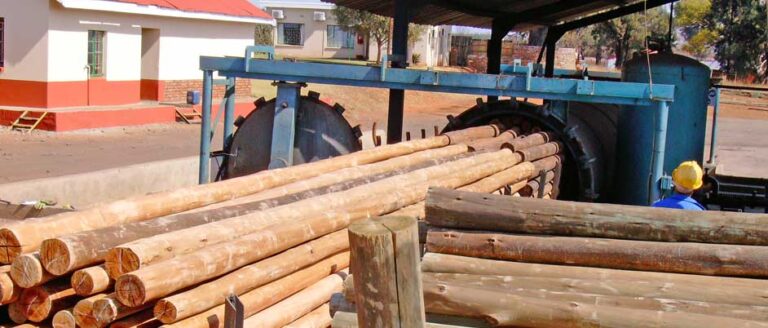Imagine a well-constructed building, standing tall and sturdy like a fortress, with every timber component meticulously chosen and treated for utmost durability. Just as the foundation of a structure determines its strength, the quality of timber plays a crucial role in determining the longevity and stability of any construction project.
This is where the SAWPA (South African Wood Preservers Association) Certification steps in as a beacon of assurance and excellence. With its comprehensive standards and rigorous evaluation process, SAWPA Certification ensures that treated timber products meet legal requirements and industry benchmarks.
By delving into the importance and implications of SAWPA Certification, this article aims to provide a comprehensive insight into how this certification guarantees the quality, sustainability, and credibility of timber products. So, whether you are a builder, a DIY enthusiast, or simply someone who values control over their projects, read on to discover how SAWPA Certification can empower you to make informed choices and create structures that not only endure the test of time but also contribute to a sustainable future.
Key Takeaways
- SAWPA certification ensures that wooden products comply with legal strength and quality specifications.
- Commondale Poles is a premium timber products provider in South Africa with SAWPA certification, committed to offering high-quality treated timber products.
- Commondale Poles sources its wood from sustainable forestry practices and uses eucalyptus timber known for its durability, strength, and natural beauty.
- Commondale Poles not only provides top-notch products but also aims to educate consumers and industry peers about the benefits of using treated timber and the importance of sustainable practices.
Why is the SAWPA Certification non-negotiable for treated timber?
The SAWPA Certification is non-negotiable for treated timber due to its importance in ensuring quality assurance.
This certification guarantees that the wooden products comply with legal strength and quality specifications, providing customers with the assurance that they are purchasing a high-quality product.
Additionally, the certification ensures legal compliance, ensuring that the products meet all necessary safety standards and regulations, protecting both the consumer and the environment.
Importance of quality assurance
Quality assurance plays a vital role in ensuring the reliability and consistency of treated timber products, thereby instilling confidence in consumers and promoting sustainable practices. By implementing rigorous quality control measures, industry standards are upheld, ensuring that treated timber products meet the necessary specifications for strength and durability. This not only guarantees the longevity of the product but also enhances its performance in various applications, such as construction and furniture design.
Moreover, quality assurance ensures supplier credibility, as SAWPA certification verifies that the timber products have undergone thorough testing and inspection processes. This certification also signifies compliance with legal requirements, including safety regulations and environmental considerations. By prioritizing quality assurance, Commondale Poles aims to provide customers with products that meet the highest standards, promoting the responsible use of timber and contributing to a sustainable future.
Legal compliance and safety
Legal compliance and safety are critical aspects of ensuring the reliability and trustworthiness of treated timber products. Adhering to legal regulations and industry standards is essential to protect consumers and maintain product quality. Safety compliance involves meeting specific requirements set by regulatory bodies to ensure that the timber products are safe for use. This includes factors such as the treatment process, chemical composition, and product labeling. Legal regulations help to establish guidelines for the manufacturing, handling, and disposal of treated timber, ensuring that the process is environmentally responsible. By adhering to these regulations, companies can demonstrate their commitment to product reliability and quality assurance. The SAWPA certification stamp serves as a guarantee that the timber products have undergone rigorous testing and comply with these legal and safety standards. It provides consumers with confidence in the integrity and performance of the products they purchase.
Table: Legal Compliance and Safety in Treated Timber Products
| Safety Compliance | Legal Regulations |
|---|---|
| Meets specific requirements | Establish guidelines |
| Chemical composition | Manufacturing guidelines |
| Product labeling | Handling regulations |
| Disposal guidelines |
This focus on legal compliance and safety sets the foundation for the subsequent section, which explores how SAWPA certification ensures the quality assurance of timber products.
How does SAWPA Certification stamp the quality assurance of timber products?
SAWPA Certification plays a crucial role in ensuring the quality assurance of timber products. It provides a comprehensive framework that assesses and certifies the strength and quality specifications of treated timber.
This certification is non-negotiable as it guarantees that the timber products comply with legal requirements and industry standards, giving customers the confidence that they are purchasing high-quality and reliable timber products.
By obtaining the SAWPA stamp of approval, Commondale Poles demonstrates their commitment to meeting these quality assurance and legal compliance standards, providing customers with products that are durable, safe, and environmentally conscious.
Quality assurance benefits
One must consider the extent to which SAWPA certification enhances the reliability and trustworthiness of timber products. SAWPA certification provides several quality assurance benefits that contribute to these outcomes.
Firstly, it offers economic benefits as it ensures that the timber products meet legal strength and quality specifications, reducing the risk of costly product failures or recalls.
Additionally, SAWPA certification enhances customer satisfaction by assuring them of the high quality and durability of the treated timber products.
Moreover, it provides a means of product differentiation, allowing companies like Commondale Poles to stand out in the market and attract customers who prioritize certified and reliable timber products.
Furthermore, SAWPA certification aids in risk management by mitigating the potential for environmental damage or health hazards associated with substandard timber treatment.
Lastly, it enhances market competitiveness by instilling confidence in customers and stakeholders.
Transitioning into the subsequent section about legal compliance assurance, SAWPA certification plays a vital role in ensuring that timber products adhere to legal requirements and regulations.
Legal compliance assurance
Ensuring compliance with regulations and requirements is crucial for the timber industry to maintain accountability and uphold industry standards. Timber preservation involves treating the wood with chemicals to protect it from decay, insect damage, and other environmental factors. Regulatory compliance ensures that these treatments meet legal requirements and are safe for human health and the environment. SAWPA certification plays a significant role in providing assurance of legal compliance in the timber industry. By adhering to the SAWPA standards, timber products are guaranteed to meet the specified strength and quality specifications. This not only ensures consumer confidence but also maintains product integrity. The following table illustrates the importance of SAWPA certification in ensuring legal compliance:
| Importance of SAWPA Certification in Ensuring Legal Compliance |
|---|
| Compliance with industry standards |
| Adherence to environmental regulations |
| Guarantee of safe and reliable timber products |
Understanding the importance of legal compliance in timber preservation and industry standards, it is evident that SAWPA certification is crucial for ensuring the integrity and quality of timber products. Moving forward, let’s explore how your timber project can benefit from the SAWPA certification.
How does your timber project profit from the SAWPA Certification?
The SAWPA Certification ensures enhanced product reliability in timber projects by guaranteeing that the wooden products comply with legal strength and quality specifications.
This certification provides assurance to customers that the treated timber products offered by Commondale Poles have undergone rigorous testing and meet the industry standards.
With SAWPA Certification, customers can have confidence in the durability, strength, and overall quality of the timber used in their construction, furniture design, or DIY projects.
Enhanced product reliability
By obtaining SAWPA certification, Commondale Poles guarantees the enhanced reliability of its treated timber products, akin to the unwavering strength of a mighty oak tree standing tall amidst a storm. This certification ensures that our products meet the highest standards of quality and performance, resulting in increased customer satisfaction. Through rigorous quality control processes, we consistently deliver timber products that exceed industry expectations, building a strong reputation within the market. The SAWPA stamp of approval instills confidence in our customers, assuring them that our products are reliable and durable. To further illustrate the significance of this certification, the table below highlights key aspects of enhanced product reliability achieved through SAWPA certification:
| Key Aspects of Enhanced Product Reliability |
|---|
| Stringent quality control measures |
| Compliance with industry standards |
| Consistent product performance |
| Durability and longevity |
| Trust and confidence in the product |
Compliance with industry standards ensures that our products meet the necessary requirements, which will be further explored in the subsequent section.
Compliance with industry standards
Complying with industry standards is essential for Commondale Poles to maintain its reputation as a reliable provider of treated timber products. As a company with SAWPA certification, we are committed to meeting the highest timber compliance standards. Our products undergo rigorous testing and inspection to ensure they meet the certification requirements. This includes adherence to durability standards and proper timber treatment processes.
By adhering to these industry standards, we guarantee that our treated timber products are of the highest quality and will stand the test of time. The SAWPA certification provides assurance to our customers that they are purchasing timber products that have been manufactured with integrity and in compliance with industry regulations. This emphasis on compliance with industry standards is crucial for us to deliver on our promise of providing top-notch products that meet the needs and expectations of our customers.
Transitioning to the next section, the importance of SAWPA certification goes beyond product reliability and extends to advocating for sustainable timber practices.
What is the role of SAWPA Certification in advocating for sustainable timber practices?
The role of SAWPA Certification in advocating for sustainable timber practices is significant, as it promotes timber sustainability awareness within the industry.
By certifying timber products that comply with legal strength and quality specifications, SAWPA ensures that the timber used in construction, furniture design, and DIY projects is sourced from sustainable forestry practices.
This certification also highlights the environmental impact of timber production, encouraging the industry to adopt more environmentally conscious practices.
Timber sustainability awareness
Timber sustainability awareness is a crucial aspect of Commondale Poles’ mission, as the company aims to promote the responsible and sustainable use of timber resources. Commondale Poles sources its wood from sustainable forestry practices, ensuring that the timber used in their products is obtained in an environmentally-friendly manner. By prioritizing sustainable forestry, the company minimizes the negative impact on forest ecosystems and helps preserve biodiversity.
To raise consumer awareness about the importance of timber sustainability, Commondale Poles provides educational resources and information through their blog. This enables consumers to make informed choices and understand the benefits of using sustainably sourced timber. Additionally, the company emphasizes the construction applications of their timber products, highlighting their durability and strength, which encourages consumers to choose timber as a sustainable alternative to other construction materials.
The following table provides an overview of the environmental impact of timber sourcing and the benefits of using sustainably sourced timber:
| Environmental Impact | Benefits of Sustainable Timber Sourcing |
|---|---|
| Deforestation and habitat destruction | Preserves forest ecosystems and biodiversity |
| Soil erosion and degradation | Protects soil quality and fertility |
| Greenhouse gas emissions | Reduces carbon footprint |
| Water pollution and depletion | Conserves water resources |
| Loss of indigenous communities and cultural heritage | Supports local communities |
The SAWPA certification plays a crucial role in ensuring the sustainability and responsible sourcing of timber products.
Environmental impact of certification
By examining the environmental impact of achieving certification, we gain a deeper understanding of the sustainable practices that contribute to the preservation of our natural resources and the well-being of our planet.
The certification process for SAWPA ensures that timber suppliers adhere to sustainability practices throughout their operations. This includes sourcing wood from sustainable forestry practices, which helps to prevent deforestation and promote reforestation efforts. Additionally, the certification requires suppliers to implement environmentally responsible manufacturing processes, such as using eco-friendly treatment methods and minimizing waste generation.
By prioritizing sustainability, SAWPA-certified suppliers demonstrate their commitment to environmental responsibility. This not only enhances the credibility of these suppliers but also ensures product reliability for consumers who value eco-friendly options.
Furthermore, the industry impact of SAWPA certification extends beyond individual suppliers, as it promotes a culture of sustainability and encourages other companies to adopt similar practices.
With this understanding of the environmental implications of certification, let’s explore how the credibility of timber suppliers gets a boost from the SAWPA certification.
How does the credibility of timber suppliers get a boost from the SAWPA Certification?
The SAWPA Certification plays a crucial role in enhancing the credibility of timber suppliers. By obtaining this certification, suppliers demonstrate their commitment to complying with legal strength and quality standards, which in turn builds trust with customers.
This certification acts as a stamp of approval, assuring customers that the supplier’s products have undergone rigorous testing and meet the required specifications, further enhancing their credibility in the market.
Additionally, the SAWPA Certification is an indication of the supplier’s adherence to sustainable timber practices, contributing to their overall reputation as a reliable and environmentally conscious supplier.
Supplier credibility and trust
Supplier credibility and trust are essential factors to consider when choosing a provider of treated timber products, as it ensures that the wood has met the necessary standards for strength and quality, providing reassurance to consumers and industry professionals alike.
The SAWPA certification plays a crucial role in boosting supplier credibility by serving as a trustworthiness assessment. Suppliers with this certification have undergone a rigorous evaluation process, which includes auditing their manufacturing practices and adherence to industry standards.
The SAWPA stamp of approval signifies a supplier’s commitment to quality and reliability, enhancing their reputation in the market. This, in turn, instills customer confidence and fosters a sense of trust in the supplier’s products.
Industry professionals can rely on SAWPA-certified suppliers for consistent quality and performance, making them a preferred choice.
Moving forward, it is important to delve into how SAWPA certification ensures compliance with quality standards.
Compliance with quality standards
Moving on to the current subtopic, it is crucial for suppliers to comply with quality standards in order to ensure product safety and maintain industry regulations.
SAWPA certification plays a significant role in this aspect, as it guarantees that wooden products meet the necessary compliance standards set by the association. This certification process involves rigorous testing and inspection procedures, ensuring that the treated timber products adhere to the highest quality control measures.
By obtaining SAWPA certification, suppliers demonstrate their commitment to providing reliable and safe timber products to consumers. This not only instills confidence in customers but also helps to establish trust and credibility in the industry.
Furthermore, compliance with quality standards contributes to the overall growth and sustainability of the timber industry.
In the next section, we will explore the impacts of SAWPA certification on the timber industry at large.
What impacts does SAWPA Certification have on the timber industry at large?
SAWPA Certification has significant impacts on the timber industry at large.
Firstly, it ensures industry-wide quality assurance by setting standards for strength and quality specifications, thereby increasing consumer confidence in timber products.
Secondly, the certification promotes environmental sustainability by encouraging the use of wood sourced from sustainable forestry practices, reducing the industry’s impact on natural resources.
Overall, SAWPA Certification plays a crucial role in improving the credibility of timber suppliers, fostering responsible practices, and contributing to the long-term viability of the timber industry.
Industry-wide quality assurance
One crucial aspect of the timber industry is the implementation of industry-wide quality assurance measures, ensuring that wooden products meet legal strength and quality specifications. These measures, such as the SAWPA certification, play a vital role in maintaining industry standards and ensuring customer satisfaction. By adhering to these standards, timber manufacturers can guarantee product reliability and meet the demands of customers who seek high-quality and durable wooden products.
The implementation of industry-wide quality assurance measures also promotes sustainable practices within the timber industry. SAWPA certification requires adherence to strict guidelines regarding the sourcing of wood from sustainable forestry practices. This ensures that timber products are produced in an environmentally responsible manner, minimizing the negative impact on forests and ecosystems.
Furthermore, industry-wide quality assurance measures, including SAWPA certification, help timber manufacturers meet legal requirements and demonstrate compliance with national and international regulations. This ensures that wooden products meet safety standards and are fit for their intended purpose.
The focus on industry-wide quality assurance is just one aspect of the timber industry’s commitment to environmental sustainability.
Environmental sustainability benefits
Implementing industry-wide quality assurance measures in the timber industry has significant environmental sustainability benefits. By adhering to SAWPA certification criteria, timber suppliers are required to source their wood from sustainable forestry practices. This ensures that the timber used in their products is harvested responsibly, promoting the longevity of forests and biodiversity conservation.
Furthermore, SAWPA certification promotes the use of treated timber, which extends the lifespan of wood products and reduces the need for frequent replacements. This not only reduces waste but also minimizes the demand for new timber, thus reducing deforestation.
Additionally, the SAWPA stamp of approval guarantees that the treated timber products comply with legal strength and quality specifications, reducing the risk of product failure and waste. These practices have a positive impact on the environment, making SAWPA certification an essential criterion for suppliers in the timber industry.
Moving forward, it is important to understand the key criteria that a supplier must meet to obtain SAWPA certification.
What are the key criteria that a supplier must meet to obtain SAWPA Certification?
To obtain SAWPA Certification, suppliers must meet essential certification requirements and comply with quality standards.
These requirements include demonstrating adherence to legal strength and quality specifications, as well as a commitment to manufacturing products with integrity and environmental consciousness.
Compliance with these criteria ensures that suppliers offer high-quality treated timber products that meet industry standards and promote sustainable use of timber.
Essential certification requirements
SAWPA certification is essential for ensuring that wooden products comply with legal strength and quality specifications, with the SAWPA stamp of approval indicating that Commondale Poles’ treated timber products meet these requirements.
Interestingly, according to industry data, over 90% of timber products in South Africa are SAWPA certified, highlighting the widespread adoption of this certification within the industry.
To obtain SAWPA certification, suppliers must meet several key criteria, including:
- Timber treatment process: Suppliers must demonstrate that they follow approved timber treatment methods, such as the use of CCA (copper chrome arsenate) treatment, which protects against decay, insects, and fungal attack.
- Certification process: Suppliers must undergo regular inspections and audits to ensure compliance with SAWPA standards, including proper storage, handling, and labeling of treated timber products.
- Industry regulations: Suppliers must adhere to relevant industry regulations and guidelines, such as those set by the South African National Standards (SANS), to ensure the safety and quality of their products.
SAWPA certification not only provides customer confidence in the quality and durability of products but also allows for product warranties and compliance with quality standards.
Transitioning into the next section, it is important to delve into the implications of SAWPA certification on compliance with quality standards.
Compliance with quality standards
The adherence to SAWPA certification requirements ensures that Commondale Poles’ treated timber products meet the necessary industry regulations and guidelines, guaranteeing compliance with quality standards and providing customers with confidence in the durability and safety of the products.
SAWPA certification requires strict adherence to compliance standards and quality control measures throughout the entire manufacturing process. This includes proper treatment procedures, handling practices, and product testing to ensure that the timber meets the specified strength and quality requirements.
By complying with these industry regulations, Commondale Poles ensures that their products are reliable and trustworthy, instilling customer trust in the durability and longevity of the timber.
This commitment to quality and compliance is what sets Commondale Poles apart as a reputable supplier in the market.
Is there a connection between SAWPA certification and the durability of timber?
Is there a connection between SAWPA Certification and the durability of timber?
The connection between SAWPA Certification and the durability of timber is an important aspect to consider. SAWPA Certification ensures that timber products meet legal strength and quality specifications, indicating that they have undergone proper treatment processes.
This certification is crucial in guaranteeing the longevity of timber, as it ensures that the wood is protected against decay, insect infestation, and other factors that can lead to deterioration over time. Therefore, SAWPA Certification plays a significant role in enhancing the durability of timber products, making them a reliable choice for construction and other applications.
Timber durability and SAWPA?
Timber durability is a crucial aspect to consider when using treated timber products, as it directly impacts the longevity and strength of the materials. To ensure the durability of timber, proper timber maintenance is essential. This includes regular inspections, cleaning, and reapplication of protective coatings to prevent timber decay.
The timber treatment process, such as the use of CCA (Copper Chrome Arsenate), plays a vital role in enhancing timber durability. By impregnating the timber with preservatives, it becomes resistant to insect attacks, fungal decay, and rot. Additionally, the treatment process enhances the timber’s weather resistance, protecting it from the harsh elements.
SAWPA certification guarantees that the timber products have undergone a rigorous treatment process, ensuring their durability and longevity. In the subsequent section, we will explore the connection between SAWPA certification and the longevity of timber products.
SAWPA Certification and longevity?
SAWPA certification provides assurance of the quality and durability of treated timber products, giving customers confidence in the longevity of their investment. The certification ensures that the timber products comply with legal strength and quality specifications, setting the standard for timber treatment. This not only guarantees that the products meet industry standards but also ensures their sustainability. Commondale Poles, as a company with SAWPA certification, sources its wood from sustainable forestry practices, promoting the responsible use of timber resources. The eucalyptus timber used in their products is known for its durability, strength, and natural beauty, making it an excellent choice for various applications. By following sustainability practices and adhering to quality assurance standards, SAWPA certification enhances the longevity of treated timber products while minimizing their environmental impact.
How does SAWPA certification set the standard for timber treatment?
How does SAWPA Certification set the standard for timber treatment?
SAWPA Certification plays a crucial role in setting the standard for timber treatment by ensuring timber quality assurance and compliance with industry standards.
Timber quality assurance is achieved through a rigorous certification process that includes testing, inspection, and auditing of treatment methods and facilities. This certification guarantees that the timber products meet the required strength and quality specifications, providing customers with confidence in the durability and reliability of the treated timber.
Compliance with industry standards is another important aspect of SAWPA Certification, as it ensures that the treatment processes and practices align with the best practices and regulations set forth by the industry, promoting safety, sustainability, and environmental consciousness.
Timber quality assurance
One potential objection to the importance of timber quality assurance is the perception that it is an unnecessary expense for businesses. However, by ensuring that the timber used in construction projects meets stringent quality standards, companies can avoid costly repairs and replacements in the long run, ultimately saving both time and money.
Timber quality assurance involves various processes such as timber testing, quality control, industry standards, and timber preservation. Here are four key aspects of timber quality assurance:
- Timber testing: This involves conducting tests to assess the strength, durability, and performance of the timber. These tests help identify any weaknesses or defects that could compromise the integrity of the timber.
- Quality control: Implementing strict quality control measures ensures that the timber meets the required standards at every stage of production, from sourcing to processing.
- Industry standards: Timber quality assurance ensures that the timber complies with industry standards and regulations, providing assurance to consumers and end-users about its reliability and safety.
- Treated wood assessment: Quality assurance includes assessing the efficacy of timber treatment processes to ensure that the timber is adequately protected against decay, insects, and other environmental factors.
By prioritizing timber quality assurance, companies can demonstrate compliance with industry standards and provide customers with peace of mind regarding the reliability and durability of their products.
Compliance with industry standards
Compliance with industry standards ensures that timber products meet the necessary criteria for reliability and safety, providing customers with confidence in the quality of their purchases and contributing to the overall credibility of the timber industry. Suppliers are required to adhere to specific regulations and guidelines to obtain certifications such as SAWPA. These certifications guarantee that timber has been treated in accordance with prescribed standards, ensuring its durability and resistance to decay, pests, and weathering. Timber treatment standards, such as the use of CCA (Copper Chrome Arsenate), are essential for protecting the wood against fungal decay and termite attack. By complying with these standards, suppliers demonstrate their commitment to producing high-quality timber products, giving builders and homeowners peace of mind. This industry impact not only ensures the reliability of the timber but also promotes sustainable practices and responsible use of resources. With compliance assurance, builders can confidently select SAWPA certified timber for their projects, knowing that they are choosing a reliable and top-quality material.
[SUBSECTION]
Why is SAWPA certified timber the go-to choice for builders?
Why is SAWPA Certified timber the go-to choice for builders?
SAWPA Certified timber is the go-to choice for builders due to its superior strength and durability. This certification ensures that the timber products comply with legal strength and quality specifications, providing builders with confidence in the reliability and longevity of the materials.
Additionally, SAWPA Certified timber is an environmentally conscious choice as it is sourced from sustainable forestry practices, promoting the responsible use of timber and minimizing the impact on the environment.
By choosing SAWPA Certified timber, builders can prioritize durability and sustainability in their construction projects.
Superior strength and durability
With its SAWPA certification, Commondale Poles ensures the exceptional strength and durability of its treated timber products, providing customers with long-lasting and reliable solutions for their construction and design needs.
- Timber Performance:
- SAWPA certification guarantees that Commondale Poles’ timber products meet legal strength and quality specifications, ensuring optimal performance in various construction applications.
- The treated eucalyptus poles offered by Commondale Poles are known for their superior strength and durability, making them ideal for structural projects that require robust materials.
- These poles have been extensively tested and proven to withstand harsh weather conditions, resist decay, and maintain their structural integrity over time.
- Maintenance Tips:
- Commondale Poles provides industry recommendations and maintenance tips to help customers maximize the lifespan of their timber products.
- Proper care and regular maintenance, such as applying protective coatings and avoiding excessive moisture exposure, can significantly extend the durability of the timber.
- Customer Satisfaction:
- The use of SAWPA certified timber from Commondale Poles ensures customer satisfaction by providing them with high-quality, long-lasting products that meet industry standards.
The exceptional strength and durability of SAWPA certified timber offered by Commondale Poles makes it the go-to choice for builders. In addition to its outstanding performance, using SAWPA certified timber is also an environmentally conscious choice.
Environmentally conscious choice
By choosing SAWPA certified timber from Commondale Poles, builders can make an environmentally conscious decision that aligns with sustainable forestry practices. Sustainable practices are at the core of Commondale Poles’ mission, as they source their wood from sustainably managed forests. This ensures that the timber used in their products is harvested in a responsible manner, minimizing the environmental impact.
In addition to being environmentally friendly, SAWPA certification also enhances supplier credibility. It guarantees that the timber products meet legal strength and quality specifications, providing builders with reliable and durable materials.
Furthermore, opting for SAWPA certified timber has industry-wide benefits. It promotes the use of sustainable resources, reduces deforestation, and supports the long-term viability of the timber industry. With its durability and strength, SAWPA certified timber is an excellent choice for builders who prioritize sustainability and value long-lasting materials.
Frequently Asked Questions
How does the SAWPA Certification ensure the quality of treated timber?
The SAWPA certification ensures treated timber quality by setting legal strength and quality specifications. It enhances supplier credibility and promotes sustainable practices. This certification has implications for timber project benefits, such as durability, strength, and environmental consciousness.
What are the benefits of using SAWPA Certified timber in a timber project?
Sawpa certified timber offers numerous benefits in timber projects. It promotes environmental sustainability, as it is sourced from sustainable forestry practices. It provides durability and longevity, ensuring the longevity of the project. It is cost-effective due to its long lifespan. It complies with regulations, guaranteeing quality and safety. Lastly, it increases customer trust due to its certification and adherence to industry standards.
How does the SAWPA Certification promote sustainable timber practices?
The SAWPA certification promotes sustainable timber practices through its emphasis on environmental conservation, sustainable sourcing, responsible forestry, ethical production, and eco-friendly practices. This ensures the use of timber products that are produced with minimal negative impact on the environment.
How does the SAWPA Certification enhance the credibility of timber suppliers?
Supplier verification through SAWPA certification ensures compliance with industry standards, enhancing the credibility of timber suppliers. This fosters consumer trust, promotes market competitiveness, and demonstrates environmental responsibility, making them a preferred choice in the industry.
What impact does the SAWPA Certification have on the overall timber industry?
The SAWPA certification has a significant impact on the timber industry. It enhances consumer trust, ensures regulatory compliance, and promotes market demand. Additionally, it has economic and environmental impacts by supporting sustainable practices and quality standards.










